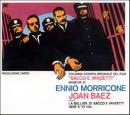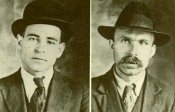We welcome to heaven Sacco and Vanzetti,
Two men that have won the highest of seats.
Come, let me show you the world that you've come through,
It's a funny old world, an' I'm sure you'll admit.
If you wear rags on earth, you're a hobo,
If you wear satin, they call you a thief.
If you save money, they'll call you a miser,
If you spend money, you live on relief.
If you work hard, of course, you are lowly,
And if you're a loafer, of course, you're no good.
If you stay sober, you're known as a sissy,
An' if you drink liquor, it goes to your head.
If you are fat, they'll call you a glutton,
If you stay skinny, they'll call you a runt.
If you laugh, they'll say you're an idiot,
An' if you cry, they'll ask you to stop.
If you chase women, they'll call you a wolfer,
If you don't chase them, they'll call you no good -- an' afraid.
If you chase men, they'll call you down-harden' [?],
An' if you don't chase them, they'll call you an old maid.
If you eat your meat fried, they'll tell you to boil it,
Then, if you boil it, they'll say it should broil.
An' if you don't eat meat, and eat only green things,
They'll ask you what's wrong with the brain in your skull.
Well, if you work for wages, you support the rich capitalist,
And if you don't work, you're a lumpen to them.
And if you play the gamble, of course, you're a gambler,
An' if you don't gamble, you never do win.
If you stay poor, nobody comes courting,
If you get rich, well, you can't find a mate.
If you get married, you're wrecking your happiness,
And if you stay single, you walk to your grave.
If you die in your cradle, it's a sad misfortune,
If you live to old age, well, it's harder and worse.
If you read the papers, you know it is many
That take their lives daily when they empty their purse.
There's traders, and trappers, and shippers, and hopers,
Sacco and Vanzetti, in America's fair lands.
There's hoppers, and croppers, and robbers, an' dopers,
And millions of folks with just two empty hands.
You come the straight road, Sacco and Vanzetti,
You fought with the lord on his most private grounds.
He hired his courts and his babblers against you,
But I'm here to say you went up and not down.
Two men that have won the highest of seats.
Come, let me show you the world that you've come through,
It's a funny old world, an' I'm sure you'll admit.
If you wear rags on earth, you're a hobo,
If you wear satin, they call you a thief.
If you save money, they'll call you a miser,
If you spend money, you live on relief.
If you work hard, of course, you are lowly,
And if you're a loafer, of course, you're no good.
If you stay sober, you're known as a sissy,
An' if you drink liquor, it goes to your head.
If you are fat, they'll call you a glutton,
If you stay skinny, they'll call you a runt.
If you laugh, they'll say you're an idiot,
An' if you cry, they'll ask you to stop.
If you chase women, they'll call you a wolfer,
If you don't chase them, they'll call you no good -- an' afraid.
If you chase men, they'll call you down-harden' [?],
An' if you don't chase them, they'll call you an old maid.
If you eat your meat fried, they'll tell you to boil it,
Then, if you boil it, they'll say it should broil.
An' if you don't eat meat, and eat only green things,
They'll ask you what's wrong with the brain in your skull.
Well, if you work for wages, you support the rich capitalist,
And if you don't work, you're a lumpen to them.
And if you play the gamble, of course, you're a gambler,
An' if you don't gamble, you never do win.
If you stay poor, nobody comes courting,
If you get rich, well, you can't find a mate.
If you get married, you're wrecking your happiness,
And if you stay single, you walk to your grave.
If you die in your cradle, it's a sad misfortune,
If you live to old age, well, it's harder and worse.
If you read the papers, you know it is many
That take their lives daily when they empty their purse.
There's traders, and trappers, and shippers, and hopers,
Sacco and Vanzetti, in America's fair lands.
There's hoppers, and croppers, and robbers, an' dopers,
And millions of folks with just two empty hands.
You come the straight road, Sacco and Vanzetti,
You fought with the lord on his most private grounds.
He hired his courts and his babblers against you,
But I'm here to say you went up and not down.
envoyé par Adriana e Riccardo - 6/1/2006 - 14:56
Langue: italien
Traduzione italiana di Riccardo Venturi
11 settembre 2014
Due parole del traduttore. Sulle derivazioni dylaniane di questa ballata si veda il commento successivo. Ci sono, inoltre, anche gli hobo...
11 settembre 2014
Due parole del traduttore. Sulle derivazioni dylaniane di questa ballata si veda il commento successivo. Ci sono, inoltre, anche gli hobo...
ACCOGLIAMO NEI CIELI
Accogliamo nei cieli Sacco e Vanzetti,
due uomini che hanno meritato la suprema dimora.
Su, vi mostrerò il mondo che avete attraversato,
ed è un vecchio, buffo mondo, son certo sarete d'accordo.
Se in Terra sei vestito di stracci, ti chiamano un hobo,
se sei vestito di raso, ti chiamano un ladro.
Se risparmi denaro, ti chiamano spilorcio,
se spendi e spandi, vivi a tuo agio.
Se lavori duro, ovviamente sei una persona modesta,
se sei un fannullone, ovviamente sei inutile.
Se resti sobrio, ti chiamano una donnicciola,
se invece bevi, l'alcool ti va alla testa.
Se sei grasso, ti chiamano goloso,
se sei magro, ti chiamano una mezzasega.
Se ridi, dicono che sei un imbecille,
se piangi, ti chiedono di smetterla.
Se vai dietro alle donne, ti chiamano donnaiolo,
se non ci vai dietro, dicono che sei un timido incapace.
Se vai dietro agli uomini, ti chiamano arrapata
e se non ci vai dietro, ti chiamano vecchia zitella.
Se friggi la carne, ti dicono di lessarla,
e se la lessi, ti dicono di arrostirla alla griglia.
Se non mangi carne e mangi solo verdure
ti chiedono cosa ti frulla storto nel cervello.
Se sei un salariato, sei dalla parte dei capitalisti,
se non lavori, per loro sei uno straccione sottoproletario.
Se giochi, naturalmente sei un giocatore
e se non giochi, non vinci mai.
Se resti povero, nessuna ti fa la corte,
se diventi ricco, non trovi una compagna.
Se ti sposi, rovini la tua felicità,
se resti scapolo, ti avvii alla tomba.
Se muori in culla, è una triste disgrazia,
se arrivi alla vecchiaia, beh, è dura per non dir di peggio.
Se leggi i giornali, sai a quanta gente ogni giorno
prendono la vita svuotandogli la borsa.
Ci sono commercianti, pellicciai, armatori e sognatori,
ci sono Sacco e Vanzetti, nelle belle terre d'America.
Ci sono ballerini, contadini, rapinatori e drogati,
e milioni di persone con solo due mani vuote.
Voi andate diritti per la vostra strada, Sacco e Vanzetti,
avete lottato col padrone sui suoi terreni più privati.
Lui ha assoldato i suoi tribunali e i suoi sparacazzate contro di voi,
ma io sono qui a dirvi che siete ascesi, e non discesi.
Accogliamo nei cieli Sacco e Vanzetti,
due uomini che hanno meritato la suprema dimora.
Su, vi mostrerò il mondo che avete attraversato,
ed è un vecchio, buffo mondo, son certo sarete d'accordo.
Se in Terra sei vestito di stracci, ti chiamano un hobo,
se sei vestito di raso, ti chiamano un ladro.
Se risparmi denaro, ti chiamano spilorcio,
se spendi e spandi, vivi a tuo agio.
Se lavori duro, ovviamente sei una persona modesta,
se sei un fannullone, ovviamente sei inutile.
Se resti sobrio, ti chiamano una donnicciola,
se invece bevi, l'alcool ti va alla testa.
Se sei grasso, ti chiamano goloso,
se sei magro, ti chiamano una mezzasega.
Se ridi, dicono che sei un imbecille,
se piangi, ti chiedono di smetterla.
Se vai dietro alle donne, ti chiamano donnaiolo,
se non ci vai dietro, dicono che sei un timido incapace.
Se vai dietro agli uomini, ti chiamano arrapata
e se non ci vai dietro, ti chiamano vecchia zitella.
Se friggi la carne, ti dicono di lessarla,
e se la lessi, ti dicono di arrostirla alla griglia.
Se non mangi carne e mangi solo verdure
ti chiedono cosa ti frulla storto nel cervello.
Se sei un salariato, sei dalla parte dei capitalisti,
se non lavori, per loro sei uno straccione sottoproletario.
Se giochi, naturalmente sei un giocatore
e se non giochi, non vinci mai.
Se resti povero, nessuna ti fa la corte,
se diventi ricco, non trovi una compagna.
Se ti sposi, rovini la tua felicità,
se resti scapolo, ti avvii alla tomba.
Se muori in culla, è una triste disgrazia,
se arrivi alla vecchiaia, beh, è dura per non dir di peggio.
Se leggi i giornali, sai a quanta gente ogni giorno
prendono la vita svuotandogli la borsa.
Ci sono commercianti, pellicciai, armatori e sognatori,
ci sono Sacco e Vanzetti, nelle belle terre d'America.
Ci sono ballerini, contadini, rapinatori e drogati,
e milioni di persone con solo due mani vuote.
Voi andate diritti per la vostra strada, Sacco e Vanzetti,
avete lottato col padrone sui suoi terreni più privati.
Lui ha assoldato i suoi tribunali e i suoi sparacazzate contro di voi,
ma io sono qui a dirvi che siete ascesi, e non discesi.
In margine.. Che Bob Dylan abbia avuto tra i suoi maestri Woody Guthrie, va direi da sé; e, infatti, questa ballata di Guthrie sembra decisamente aver fornito parecchio materiale "grezzo" a Bob Dylan per la sua famosa Rainy Day Women #12 & 35:
Certo, si tratta di una canzone che, a parte l'enigmatico titolo, avrebbe poco a che fare sia con Sacco e Vanzetti che con questo sito; ma mi sembra che l'influenza appaia ancor più chiara dall'altrettanto famosa versione italiana, vale a dire Pietre di Antoine (1967):
Certo, si tratta di una canzone che, a parte l'enigmatico titolo, avrebbe poco a che fare sia con Sacco e Vanzetti che con questo sito; ma mi sembra che l'influenza appaia ancor più chiara dall'altrettanto famosa versione italiana, vale a dire Pietre di Antoine (1967):
Riccardo Venturi - 11/9/2014 - 11:35
×
![]()









Testo e musica di Woody Guthrie
Lyrics and music by Woody Guthrie
Questa canzone, assieme ad altre, fu commissionata a Woody Guthrie tra il 1945 e il 1947 da Moses Asch
2. I Just Want To Sing Your Name
3. Old Judge Thayer
4. Red Wine
5. Root Hog And Die
6. Suassos Lane
7. Two Good Men
8. Vanzetti's Letter
9. Vanzetti's Rock
10. We Welcome To Heaven
11. You Souls Of Boston
12. Sacco's Letter To His Son (Pete Seeger)
Ballads of Sacco and Vanzetti è una raccolta di ballate folk scritte e interpretate dal cantautore americano Woody Guthrie, ispirate alla vicenda di Sacco e Vanzetti. Le ballate furono commissionate da Moses Asch nel 1945, e registrate tra il 1946 e il 1947. Guthrie non completò mai il progetto, e si ritenne insoddisfatto dal lavoro, sebbene suo figlio Arlo Guthrie, a sua volta cantautore professionista, giudicò le ballate del ciclo "Sacco e Vanzetti", tra le migliori mai composte da suo padre. Una canzone inedita, "Sacco's Letter To His Son", fu registrata da Pete Seeger per il progetto.
Ballads of Sacco & Vanzetti is a set of ballad songs, written and performed by Woody Guthrie, related to the trial, conviction and execution of Sacco and Vanzetti. The series was commissioned by Moe Asch in 1945 and recorded in 1946 and 1947. Guthrie never completed the project and was unsatisfied by the result. The project was released later in its abandoned form by Asch. An unreleased track, "Sacco's Letter To His Son" was recorded by Pete Seeger for the project.
Moses Asch was the founder/head of Folkways Records, which made available the music of Leadbelly, Woody Guthrie and Pete Seeger. Without this music, what would Dylan have been? Tom Piazza, writing in the April 1995 issue of The Atlantic Monthly, gives a history of Folkway Records and of Moses Asch:
"Born in Poland in 1905, Asch arrived in the United States when he was ten years old. He spent a few years in German in the early 1920s, studying electronics, but by the time he found himself back in New York, in 1926, his interest in American folk music had been stirred by his discovery, in a bookstall on a Paris quay, of John Lomax's book Cowboy Songs and Other Frontier Ballads.
"While building radio equipment and arranging sound systems for clients ranging from Yiddish theaters to burlesque houses on the Lower East Side, Asch came up with the idea of creating a record label to document the music that the larger commercial labels tended to leave alone.
"His idea was nourished not only by a love for the music itself but also by a brand of leftist populism in which folk expression was a voice for the disenfranchised. By taste and political conviction, Asch was attracted to the raw and the otherwise unheard.
"In the early 1940s he started two record companies, Asch and Disc. Both failed. Before folding them Asch recorded his most important artists -- the singer and songwriter Woody Guthrie and great twelve-string guitarist and singer Leadbelly.
"In 1947 Asch started Folkways, and this time it worked. Until his death, in 1986, Asch was Folkways' president, chief financial officer, talent scout, audio engineer, and sometimes shipping clerk."
"In 1987, the Smithsonian bought out Folkways, agreeing to keep all 2,200 Folkways albums in print. By writing or calling Smithsonian/Folkways (414 Hungerford Drive, Suite 444, Rockville, MD 20850; 301-443-2314 or fax 301-443-1819) one can order any Folkways title and receive a high-quality cassette, along with the original descriptive notes, for about $11. A free copy of the The Whole Folkways Catalogue, which lists every title, should be ordered first.
"It is," concludes Piazza in The Atlantic Monthly, "the definitive guide to Asch's bold, eccentric, priceless legacy."
It was an indirect impact on Dylan, but very major.
radiohazak.com